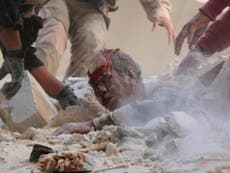We still don't know who bombed Istanbul – and that's a sign of the trouble Turkey is now in
President Erdogan has responded to the Istanbul bombings by swearing to eradicate those responsible, but it was he himself who created the conditions under which terrorism has become a permanent feature of Turkish life

The bombings that killed 38 people and injured 155 after a football match in Istanbul is the latest episode to underline Turkey’s violent instability. Government officials blame the attack on the Kurdistan Workers Party (PKK), with which the Turkish state has been fighting a guerrilla war since 1984. But only a week ago the spokesman of Isis called on its followers to target “the security, military, economic and media establishment” in Turkey.
The fact that either an offshoot of the PKK or Isis could have carried out the football stadium bombings is a measure of the trouble Turkey is now in. The credibility of the government’s initial attribution of responsibility to the PKK is undermined by its past tendency to claim that that the Kurds are behind any terrorist atrocity, regardless of the evidence. The biggest terrorist attacks in Turkey in recent months – 47 killed at Istanbul International Airport in June and 57 dead at a Kurdish wedding in Gaziantep in August – were both carried out by Isis.
The bombings will no doubt be used by Turkish President Recep Tayyip Erdogan to justify his proposed assumption of more power under a new bill just submitted to the Turkish parliament. In practice, Erdogan already wields dictatorial powers and Turkey’s shift towards becoming an authoritarian state using arbitrary powers is well under way. The last remnants of the free media are being closed down and journalists are being arrested under the guise of pursuing those responsible for the failed military coup on 15 July. Even before this purge, Kurdish population centres in the south east had been shelled and bulldozed into heaps of rubble.
Erdogan has responded to the Istanbul bombings by swearing to eradicate those responsible, but it was he himself who created the conditions under which terrorism has become a permanent feature of Turkish life. He chose confrontation with the Kurds last year in order to boost his nationalist support at the polls, while the rise of Isis in Syria since 2011 would not have been possible without Turkey’s tolerance of extreme jihadis. For a long time Isis had free passage across the Turkish-Syrian border and al-Qaeda clones, not much different from Isis, received copious supplies of arms and ammunition.
Turkey is today reaping the dire consequences of Erdogan’s past policies which created crises from which he says he will emerge victorious. But this is not going to happen because, again thanks to Erdogan, the PKK and Isis can operate from foreign sanctuaries in Syria and Iraq.
Erdogan could go a step further and increase his present limited military intervention in northern Syria and Iraq. Turkish-backed forces are getting close to the Isis stronghold of al-Bab, 25 miles from Aleppo. Turkey could launch a more widespread assault, ostensibly directed at the de facto Isis capital at Raqqa, but in reality aimed at crushing the Syrian Kurds. The Turkish leader has hitherto combined belligerent rhetoric with practical caution when it comes to Syria and Iraq, but this may not always be so.



Join our commenting forum
Join thought-provoking conversations, follow other Independent readers and see their replies